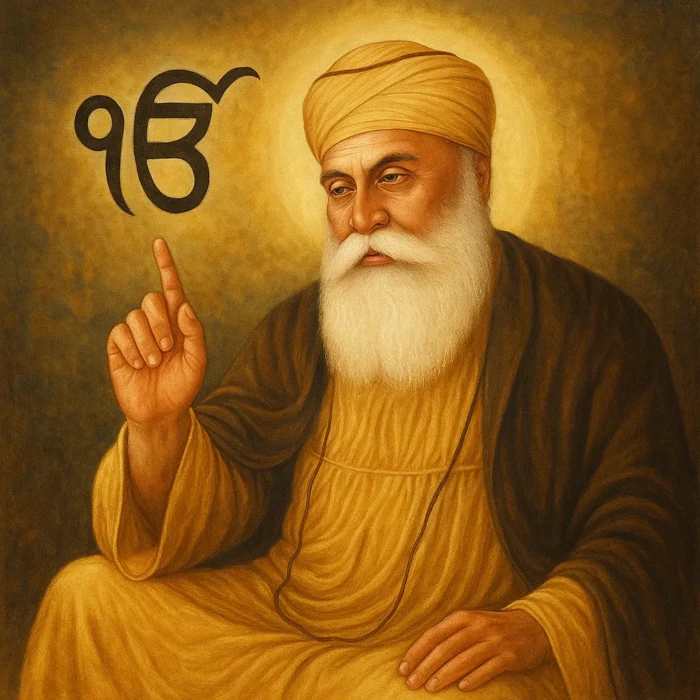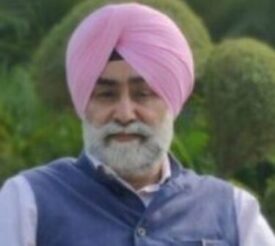 Every year, we celebrate Guru Nanak Dev Ji’s Parkash Purab with unmatched splendour. The streets glow with lights, loudspeakers thunder kirtan, and processions roll through the cities. Firecrackers fill the air; choking the very ਪਵਣੁ ਗੁਰੂ that he called sacred. Devotion has become a festival of smoke and spectacle.
Every year, we celebrate Guru Nanak Dev Ji’s Parkash Purab with unmatched splendour. The streets glow with lights, loudspeakers thunder kirtan, and processions roll through the cities. Firecrackers fill the air; choking the very ਪਵਣੁ ਗੁਰੂ that he called sacred. Devotion has become a festival of smoke and spectacle.
And yet, behind this grandeur lies a painful truth — we have not understood, much less internalised, what Guru Nanak truly preached five centuries ago.
We remember his name, but forget his message.
We sing his words, but defy their meaning.
We build monuments to him, but live opposite to everything he stood for.
Guru Nanak’s message was simple, not ceremonial. He taught us three eternal principles — ਕਿਰਤ ਕਰੋ, ਵੰਡ ਛਕੋ, ਨਾਮ ਜਪੋ — work honestly, share what you earn, and remember the Divine in humility. These were not rituals but responsibilities; not commandments to recite, but to live.
But look at us today. ਕਿਰਤ — honest labour — has disappeared from our national character. Whether in business, bureaucracy, politics, or the judiciary, deceit and manipulation have become daily habits. Truth is bent for gain, and cheating is rebranded as “smartness.” Corruption is now part of the DNA, socially accepted. We earn by falsehood and still chant his name to appear righteous. ਵੰਡ ਛਕੋ — sharing — has turned into hoarding. We measure success by what we possess, not by what we give. ਨਾਮ ਜਪੋ — remembrance of the Divine — has become a performance, not a practice. We have made spirituality into a show of loudness, not a discipline of silence. He preached logic and debate; but we deter logic and do not tolerate debate.
Guru Nanak gave us Ek Onkar — the oneness of all existence. He said, “ਨਾ ਕੋ ਹਿੰਦੂ, ਨਾ ਮੁਸਲਮਾਨ।” If he was to come today, he would add Sikh to it too. Yet five centuries later, religion has become our new border. We divide what he united. Caste, creed, and power have replaced compassion. Faith, which was meant to free, now enslaves. The places of worship are now commercial ventures. The tide of intolerance has now peaked to a point where a Canadian city had to pass a motion against anti-Hindu hate. No community should ever face hatred or discrimination. Yet the very need to legislate against hate is a mirror to our times — a reminder of how far humanity has strayed from Guru Nanak’s universal vision.

Is former Member of Punjab Public Service Commission
A farmer and keen observer of current affairs
He condemned hollow ritual, arrogance, and hypocrisy — of both Brahmins and Mullahs. He mocked sacred threads and meaningless prayers, calling them symbols of ego. The real thread, he said, is woven from ਦਇਆ, ਸੰਤੋਖ, ਸਤ, ਜਤ, and ਭੈ — compassion, contentment, truth, self-discipline, and reverence. Yet today, religion has become business. Temples, mosques, and gurdwaras built in his name compete to sell the very rituals he rose against.
When Babur invaded Punjab, slaughtering innocents and desecrating homes, Guru Nanak did not stay silent. In his Babar Vani, he became the first Indian voice of moral resistance.
“ਖੁਰਾਸਾਨ ਖਸਮਾਨਾ ਕੀਆ ਹਿੰਦੁਸਤਾਨੁ ਡਰਾਇਆ।” — The Lord of Khurasan sent Babur to terrify Hindustan.
“ਸੇਈ ਦੁਖ ਸਹੇ ਦਰਿ ਬਾਬਰ ਕੇ… ਹੁਣਿ ਨਾਨਕ ਮਿਟੀਏ ਖਸਮੁ।” — Those who suffered under Babur’s cruelty, Nanak says, may their cries awaken the Lord.
He condemned tyranny — and the silence that allowed it. He spoke truth to empire when others bowed. His rebellion was not political; it was moral.
Five centuries later, where are such voices? We drown in political noise, but when injustice rises, we stay mute. Guru Nanak faced the sword of an emperor; we tremble before a tweet from power.
He denounced caste long before equality became law. He ate with Bhai Lalo, the humble carpenter, and rejected Malik Bhago’s feast of greed. He asked the Brahmin — if you are born pure, why are others not? He asked the ruler — if you are chosen by God, why do you oppress His children? He declared all humans equal, all labour sacred. Yet even in the Punjab he walked through, caste arrogance still poisons hearts. Caste slurs echo in elections; crowds laugh, not protest.
He elevated the status of women when the world demeaned them.
“ਸੋ ਕਿਉ ਮੰਦਾ ਆਖੀਐ ਜਿਤੁ ਜੰਮਹਿ ਰਾਜਾਨ।” — Why call her inferior, from whom kings are born?
Five centuries later, we still treat women’s voices as inconvenient and their freedom as negotiable.
He extended his vision beyond humanity to the planet itself:
“ਪਵਣੁ ਗੁਰੂ ਪਾਣੀ ਪਿਤਾ ਮਾਤਾ ਧਰਤਿ ਮਹਤ।” — Air is the Guru, water the father, earth the great mother.
For him, the environment was sacred. Today, our rivers die, our fields burn, and our skies blacken — even as we burst fireworks in his name. We thank him by destroying the world he taught us to revere.
The heart of his teaching lies in two words — ਨਿਰਭਉ and ਨਿਰਵੈਰ — without fear, without hate. But our lives and politics are ruled by both. We fear the truth and feed hate to power. We shout his name and practise the opposite of what he lived.
And the most beautiful of his teachings — ਸਰਬੱਤ ਦਾ ਭਲਾ — the welfare of all — has become the most ignored. We end every ardas with those words, but live as if they don’t exist. We rise by pulling others down. We build our success on the ruins of someone else’s struggle. We cheat, betray, and backstab to grow — and then, with loud voices, proclaim ourselves his followers. Hypocrisy has become faith’s twin.
He said ਪਹਿਲਾ ਮਰਣੁ ਕਬੂਲੁ ਜੀਵਣ ਕੀ ਛਡਿ ਆਸ but we consider ourselves as permanent on this world.
In 1981, at Dera Baba Nanak, a farmer-poet, Kartar Singh Sawadhi, expressed this shame in a poem my father, S. Bhupinder Singh Mann, then President of the Bharatiya Kisan Union, still remembers by heart. The poem said:
“ਹੁਣ ਨਾਂ ਇਥੇ ਆਵੀਂ ਬਾਬਾ… ਇਸ ਬੇੜੀ ਨੂੰ ਡੁੱਬ ਲੈਣ ਦੇ, ਕੰਢੇ ਨਾਂ ਤੂੰ ਲਾਵੀਂ ਬਾਬਾ।”
It was not defiance of the Guru; it was despair before him — a confession that we are unworthy of his return. If Guru Nanak were to walk again among us, he would find his name commercialised, his truth politicised, and his message buried beneath marble and microphones. Full text of the poem is below.
We have turned faith into formality. We do paath but not parchar. We polish marble but not morals. We perform religion but do not practise righteousness. We seek moksha without justice, paath without purity, religion without humanity. But Guru Nanak taught that if religion is not humanity, then it is nothing.
He said, “ਸਚੁ ਉਪਰਿ ਸਭੁ ਕੋ ਉਪਰਿ ਸਚੁ ਆਚਾਰੁ।” — Truth is above everything, but higher still is truthful living. That was his message — not to worship truth, but to live it.
If Guru Nanak were to walk through Punjab today, he might not find Babur’s army, but he would find his spirit alive — in greed, intolerance, caste arrogance, and hypocrisy. He would not ask our religion; he would ask our conscience. He would not look at our ceremonies; he would look into our conduct.
Five hundred years ago, he lit a lamp of reason, compassion, and equality. Today, we light candles in his name — but the darkness remains within us. Until we live his words, not just repeat them, Guru Nanak will remain our pride in speech, but our stranger in practice.